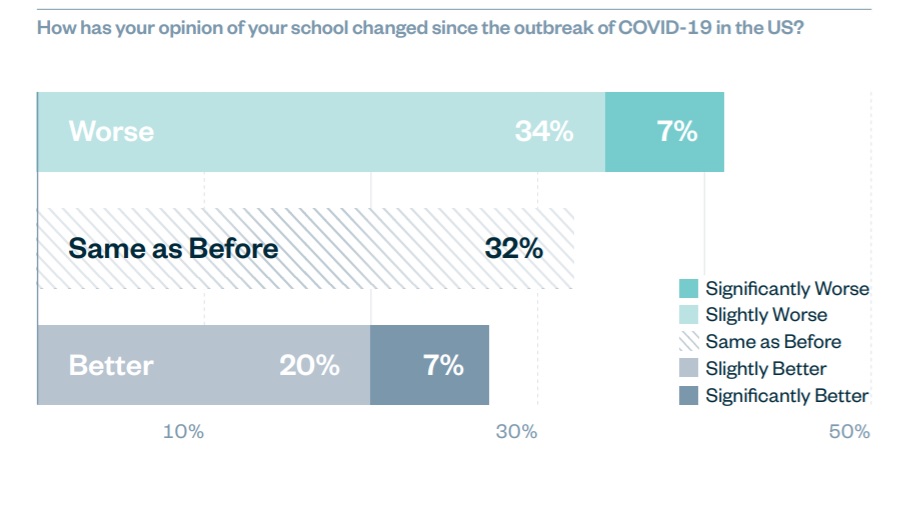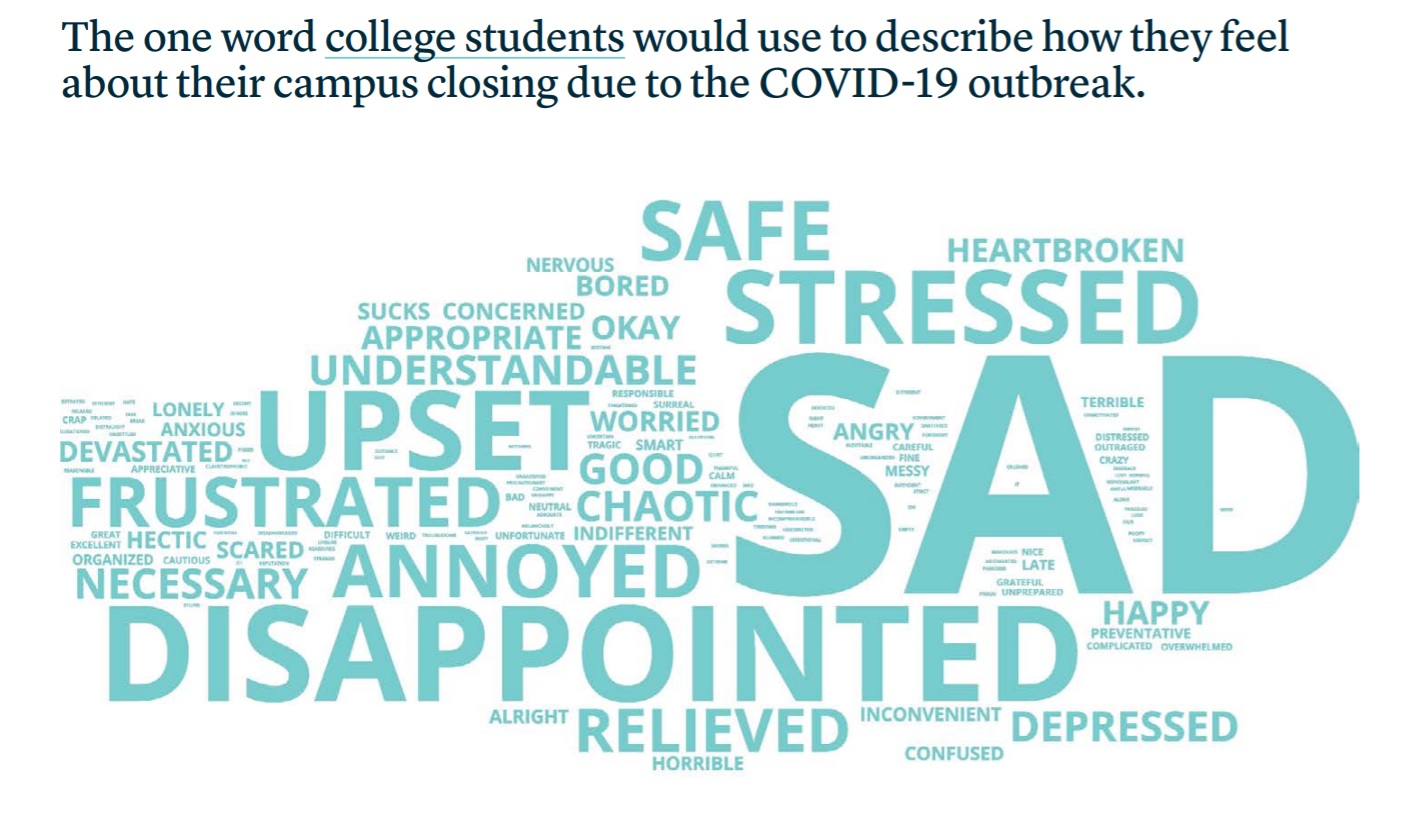Pictured above: SimpsonScarborough, a research and marketing firm in Alexandria, Virginia, asked 513 college freshmen, sophomores, and juniors how they felt about their campus closing due to the COVID-19 outbreak. This infographic visualizes their responses.
Courtesy of SimpsonScarborough
By The Crow’s Nest Staff
Now that most of America’s college students are taking their classes remotely, how do they rate the online instruction they are receiving?
Not very highly, according to one national survey.
The survey, conducted March 26-30, found that two-thirds of the respondents at four-year colleges and universities around the country think the quality of online instruction is worse than in-person instruction.
SimpsonScarborough, a research and marketing firm in Alexandria, Virginia, that specializes in higher education, surveyed 513 freshmen, sophomores and juniors. The survey’s margin of error is plus or minus 4.27 percent.
According to the survey, 97 percent of the student respondents have switched to online classes as a result of the COVID-19 pandemic.
The respondents were asked: “How does online instruction compare to the in-person instruction you received at your school?”
Their answer: A lot worse, 13 percent; worse, 50 percent; about the same, 31 percent; better, 5 percent; a lot better, 0 percent. (See the survey results here.)

When the survey was conducted, most schools had just shifted to online instruction, and SimpsonScarborough stressed that “the situation is changing rapidly” and students’ opinions could change dramatically as time passes.
“While exposure to online learning may lead some students to see it as a valid alternative,” the researchers said, “we expect a resurgence of interest in the traditional residential 4-year college experience once the pandemic subsides.”
The survey was released as thousands of students around the country began to push for a reduction in their tuition fees.
At schools like Northwestern University, the University of Illinois at Chicago and the University of Iowa, thousands of students have signed petitions seeking a partial tuition refund.
At the University of Chicago, where the cost of annual tuition is about $58,000, at least 800 students are threatening to skip a tuition payment due this month, according to the Chicago Tribune.
Students at two other schools – the University of Miami and Drexel University – have filed class-action lawsuits in federal court in South Carolina seeking tuition reimbursements.
The students, who are alleging breach of contract and unjust enrichment at their universities, contend that they selected their schools based on advertising touting the institutions’ on-campus experiences.
Their tuition covers more than academic instruction, the lawsuits say. It also covers labs, libraries, art, extracurricular activities, social development and networking opportunities, according to a report in Law360, a website that offers news and analysis of legal matters.
Around the country, many colleges and universities are offering refunds or partial refunds of certain fees and room and board.
But so far almost all institutions are refusing to refund tuition payments, although some have promised to avoid tuition increases in the 2020-2021 school year.
The schools contend that they are still offering quality instruction – even though it is coming online.
The schools also are loathe to cut tuition – their principal source of revenue – because of the ripple effect it would have on faculty and staff salaries, hiring, research and other expenses.
Meanwhile, the pandemic is prompting some high school seniors to rethink their college plans.
Many are now planning to attend a school that is closer to home or less expensive, take a year off or abandon college plans altogether, according to The New York Times.
The American Council on Education, a higher education trade group, recently predicted a 15 percent drop in enrollment – and $23 billion revenue loss – at colleges and universities in the fall, according to the Times.
That leaves the schools themselves wrestling with how they will cope with the decline in revenue and how – and when — they will reopen.
USF has already adjusted some fees this semester, including partial refunds on housing and meal plans. However, the university is not issuing refunds on parking passes, tuition, or Activities and Services fees, which are allocated by Student Government to clubs and organizations every year.
Additionally, the administration is proposing further adjustments for the summer, with the specifics available here.
The university system Board of Trustees will vote on the proposed summer fee schedule on May 7.
Details on the proposed changes and other fee structures are on the USF Coronavirus Student FAQ website.
Compiled from reports in the Chicago Tribune, The New York Times, the Boston Globe and the Inside Higher Ed and Law360 websites.
What do you think?
It’s been a month since instruction at USF St. Petersburg went remote.
Tell us what you think.
How does remote learning compare to traditional instruction? Are you getting your money’s worth? If the university is still offering only online instruction in the fall, would you consider transferring or taking a semester off? Send us your thoughts – with your name, class and major – below.



